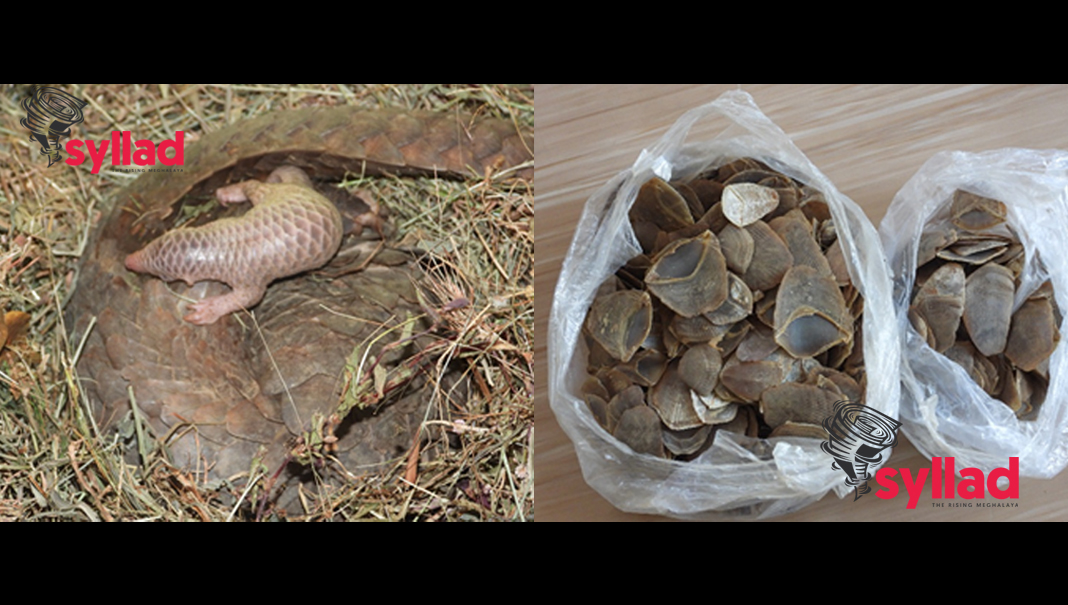Interstate trafficking of wildlife surfaces with the rescue of one Pangolin from 3 traffickers in Meghalaya

In alarming state of affairs, an interstate trafficking of wildlife listed in the Schedule-I of the Wild Life (Protection) Act, 1972 has surfaced along Assam-Meghalaya with the recent arrest of three traffickers with a consignment of one live Indian Pangolin and 1.20 Kg Pangolin scales seized from their possession.
According to an official sources, the Jaintia Hills Wildlife Division received an input that there is an organized gang of traffickers along the border areas of West Jaintia Hills- West Karbi Anglong actively engaged in poaching and trafficking of wild animals and their body parts and the office alerted its network to ascertain the veracity of the inputs.
A specific input was received from one of the informers on 11th November, last that some persons will bring some wild animals and their body parts from West Karbi Anglong District to West Jaintia Hills for sale. Accordingly, a team of officials from the Jaintia Hills Wildlife Division led by the Divisional Forest Officer laid a trap at Khanduli village to intercept the traffickers. A team of police officials was also present at the Khanduli to assist the forest officials.
At around 2.00 PM on 11th November, last, the team saw a car coming from Hamren. The team stopped the car and found three persons named Serus Bhoi son of E Shylla, Francis Lamare son of K. Biam and Arki Lamare son of K. Biam, all residents Namdong-B village inside the car. On search, a live Indian Pangolin and 1.20 Kg Pangolin scales were found in the car. All the three persons were arrested and were brought to Jowai. On interrogation, these persons divulged that the live Pangolin and Pangolin scales were purchased from a person in Hamren in West Karbi Anglong District
On 12th November, last they were produced before the Chief Judicial Magistrate, Jowai Court, the Chief Judicial Magistrate, Jowai Court remanded the accused to judicial custody and allowed the Divisional Forest Officer to conduct the interrogation of the accused inside the Jowai District Jail.
Further investigation to unravel the entire chain of illegal trafficking and to identify and arrest other persons involved in capture, hunting, transportation and purchase of wild animals and their body parts is presently under progress.
The live Pangolin and Pangolin scales found in possession of these persons were also seized and brought to Jowai. On 12th November, last the Pangolin gave birth to a healthy baby. The seized Pangolin along with the baby will shortly be released at a safe and secure location within the Narpuh Wildlife Sanctuary after obtaining approval from the Court.
The India Pangolin (Manis crassicaudata) is listed in Schedule-I of the Wild Life (Protection) Act, 1972 and attracts highest level of protection available to a wild animal in India. It is also listed as Endangered, on the International Union for Conservation of Nature (IUCN) Red List of Threatened Species. Hunting and possession of a Pangolin is punishable under the Wild Life (Protection) Act, 1972 with imprisonment for a term which shall not be less than three years but may extend to seven years and also with fine which shall not be less than ten thousand rupees but may extend to twenty five thousand rupees.
Pangolins play a critical role in their ecosystems. They provide the earth with all-natural pest control and are fantastic tenders of soil, and they do these things simply through their everyday behaviors. It is said that a single pangolin consumes as many as 70 million insects per year, mainly ants and termites.
Pangolins are trafficked for their meat and their scales, which are used in traditional Chinese medicine. China is a major destination for pangolins and pangolin products. Illegal sale and trafficking of Pangolins involves huge environmental, ecological and health risks.

Very Big achievement.